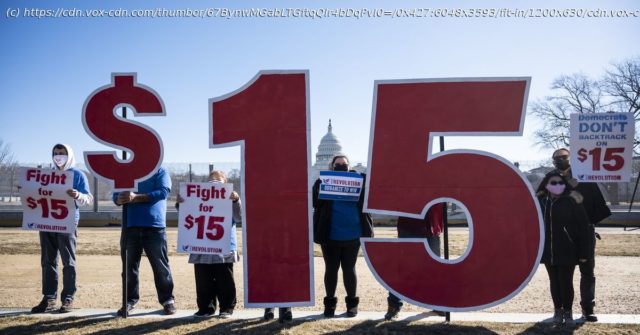Democrats haven’t given up on increasing the minimum wage just yet.
The Senate parliamentarian on Thursday dealt Democrats a disappointing blow in the fight for the $15 minimum wage, ruling that it can’t be included in a Covid-19 relief package if lawmakers want to use budget reconciliation. That decision likely means that the $15 minimum wage is effectively dead — for now. As Sen. Bernie Sanders (I-VT) has said repeatedly,10 Republican senators are not going to sign on to this type of increase, meaning lawmakers won’t be able to get the 60 votes it needs to pass through regular order. Given this dynamic, Democrats are now scrambling to figure out how they could still push for some kind of minimum wage increase via either the relief package or a standalone compromise bill with Republicans down the line. “We are not going to give up the fight to raise the minimum wage to $15 to help millions of struggling American workers and their families,” Senate Majority Leader Chuck Schumer said in a statement. A couple of options have been floated, but none appear to have the full support of the party’s caucus just yet. One of the most straightforward possibilities — which progressives have pushed — is for Democrats to simply ignore the decision of the parliamentarian and include the $15 minimum wage in the bill anyway. That suggestion has garnered pushback from moderate Sens. Joe Manchin (D-WV) and Kyrsten Sinema (D-AZ), however, a sign that it probably won’t happen. Sanders, Sen. Ron Wyden (D-OR), and other Democrats also floated the idea of establishing a tax penalty that incentivizes large corporations to pay their workers a $15 minimum wage and gives small businesses a tax credit for doing so. That change wouldn’t set a new federal standard for the minimum wage, but it could help nudge businesses into offering their employees better pay. Schumer, too, had offered his backing for a plan that dings corporations that don’t raise their wages. But over the weekend, Democrats determined the idea is a no-go for now. Ultimately, Democrats may have to consider a potential compromise with Republicans to advance any type of standalone change to the minimum wage. Thus far, five Republicans — led by Sens. Mitt Romney (R-UT) and Tom Cotton (R-AR) — have backed legislation that would increase the minimum wage to $10 by 2025, a change that would also be tied to immigration enforcement. Sen. Josh Hawley (R-MO), too, has introduced a bill that would require a $15 minimum wage at companies that make $1 billion or more in annual revenues. Such limited changes, though, fall far short of what many Democrats have been demanding, suggesting that the minimum wage could be among the policy areas that build the case for eliminating the filibuster down the line. Were Democrats to take that route, they’d be able to approve all types of legislation, including a $15 minimum wage, with 51 votes. Following is a rundown of ideas that have been suggested so far. Fire or ignore the parliamentarian Because the parliamentarian’s decision is simply advice and not a binding verdict, Democrats still have the option of either firing her or ignoring her guidance, though they probably won’t do so. Many progressives have called for Democrats to keep the $15 minimum wage in the bill despite the parliamentarian’s position, a move that would likely prompt a challenge from Republicans on the floor. If a challenge is lodged while the bill is being debated, Vice President Kamala Harris — or whoever is presiding over the Senate — is able to overrule that challenge, effectively preserving the $15 minimum wage. Then 60 votes would be needed to nullify Harris’s decision.
Домой
United States
USA — Financial Democrats’ remaining options for raising the minimum wage, explained






